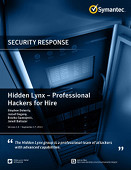Smart phones these days are bristling with sensors. Forget about the camera and microphone – there are accelerometers, Global Positioning System components, not to mention Bluetooth and NFC transmitters. All those remote sensors enable all kinds of cool features – from finding the nearest Starbucks to mobile payments. But they also pose a risk to the privacy of the phone’s owner – as malicious actors (and the occasional national government) look for ways to turn cameras and other sensors into powerful, cheap and convenient spying tools. Now researchers at The University of Cambridge have demonstrated one possible, new attack type: harnessing the built-in video camera and microphone on Android devices to spy on an owner’s movements and guess his or her password. The technique could be a way for cyber criminals to defeat anti-keylogging technology like secure “soft” keyboards used to enter banking PINs and other sensitive information. The work […]
Banking
At MIT Conference, Warnings of Big Data Fundamentalism
A senior Microsoft researcher issued a stern warning about the negative consequences of the current mania for data harvesting saying that a kind of “fundamentalism” was emerging regarding the utility of what’s been termed “Big Data” that could easily lead to a Orwellian future of ubiquitous surveillance and diminished freedom. Speaking to an audience of around 300 technology industry luminaries at the Massachusetts Institute of Technology’s annual Emerging Technology (EMTECH) conference, Kate Crawford, a Principal Researcher at Microsoft Research in Boston said that the technology industry’s fetish for “Big Data” had blinded it to the limits of analytics, and the privacy implications of wholesale data harvesting. The Massachusetts Institute of Technology’s (MIT’s) annual Emerging Technologies (EMTECH) conference, a high-gloss event that throws entrepreneurs, venture capitalists and academics together to talk ‘big ideas’ on TED-inspired sets. Crawford’s speech, coming on the heels of a talk about transforming healthcare with big data […]
APT-For-Hire: Symantec Outs Hidden Lynx Hacking Crew
This site and others have been writing about the “Advanced Persistent Threat” problem, which has generally been treated as a euphemism for the government and military of The People’s Republic of China or – in some cases – Russia, Iran, North Korea or other un-friendlies. Firms like Mandiant have taken pains to separate the concept of APT from run of the mill cyber criminal hacking groups whose motivation is profit, rather than the acquisition of information that can be used to advance geopolitical or economic goals. Cyber criminal groups may well use “advanced” in their attack methods and “persistent” in their efforts to compromise victim networks, but they weren’t “APT.” Now Symantec Corp. has put a fly into that ointment: publishing a report that pulls the covers off an APT group dubbed “Hidden Lynx” that it claims is responsible for some of the most sophisticated and large scale hacks of […]
Why The Mailpile Misstep Is No Joke To PayPal
PayPal and Mailpile, the scrappy secure mail startup ended the week on a high note: hugging it out (via Twitter) after the online payments behemoth froze more than $40,000 in payments to the crowd-funded startup then donated $1,000 to the project, to boot. But making it right with the tiny secure email firm is just the beginning of the story at PayPal, which is making the whole mix-up as something of an object lesson in how it needs to change to address a fluid and fast-moving online payments market. First, some background: Mailpile, of Reykjavík, Iceland, has raised more than $145,000 in a month-long campaign on the crowd funding web site Indiegogo.com to build a “fast, web-mail client with user-friendly encryption and privacy features.” Beginning on Saturday, PayPal froze more than $40,000 of those donations, suspecting fraud. The company’s spokespeople told company executive Brennan Novak that it wanted to see […]
Are Anti-Mule Ops Breaking The Bank Fraud Kill Chain?
Mules are the “last mile” in many online fraud operations: the unwitting dupes, or witting co-conspirators who lend their legitimate bank account (and reputation) to fraudsters who are looking for a way to cash out funds from a compromised account. Mules – often lured with promises of “work-from-home” riches receive fraudulent transactions, then immediately withdraw the funds and wire them to the fraudsters, minus a healthy “commission.” In recent years, there has been ample coverage in the media of cyber crime and fraud and the role of money mules in scams. (I note Brian Krebs excellent reporting on the mule problem on his blog.) And yet, the supply of mules seems to be endless. Or is it? According to researchers at the security firm RSA, bank account cash-out attacks are becoming less common online, and a sharp increase in busts on money mules may be the cause. Writing on […]



